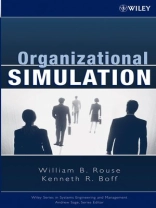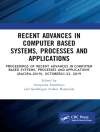From modeling and simulation to games and entertainment
With contributions from leaders in systems and organizational
modeling, behavioral and social sciences, computing and
visualization, and gaming and entertainment, Organizational
Simulation both articulates the grand vision of immersive
environments and shows, in detail, how to realize it. This book
offers unparalleled insight into the cutting edge of the field,
since it was written by those who actually researched, designed,
developed, deployed, marketed, sold, and critiqued today’s best
organizational simulations.
The coverage is divided into four sections:
* Introduction outlines the need for organizational simulation to
support strategic thinking, design of unprecedented systems, and
organizational learning, including the functionality and technology
required to enable this support
* Behaviors covers the state of knowledge of individual, group, and
team behaviors and performance, how performance can best be
supported, how performance is affected by national differences, and
how organizational performance can best be measured
* Modeling describes the latest approaches to modeling and
simulating people, groups, teams, and organizations, as well as
narrative contexts and organizational environments within which
these entities act, drawing from a rich set of modeling methods and
tools
* Simulations and Games illustrates a wide range of fielded
simulations, games, and entertainment, including the methods and
tools employed for designing, developing, deploying, and evaluating
these systems, as well as the social implications for the
associated communities that have emerged
Addressing all levels of organizational simulation architecture
with theories and applications, and enabling technologies for each,
Organizational Simulation offers students and professionals the
premier reference and practical toolbox for this dynamic field.
Innehållsförteckning
Forward.
Preface.
Contributors.
1. Introduction and Overview (W. Rouse & K. Boff).
2. Strategic Thinking Via Organizational Simulation (W.
Rouse).
3. Using Organizational Simulation to Develop Unprecedented
Systems (S. Cross).
4. The Learning Organization and Organizational Simulation (D.
Andrews, et al.).
5. Requirements and Approaches For Modeling Individuals Within
Organizational Simulations (E. Hudlicka &
G. Zacharias).
6. Common Ground and Coordination in Joint Activity (G. Klein,
et al.).
7. Modeling Team Performance: The Basic Ingredients and
Research Needs (E. Salas, et al.).
8. National Differences in Teamwork (H. Klein & A.
Mc Hugh).
9. How Well Did It Work? Measuring Organizational Performance in
Simulation Environments (J. Mac Millan, et al.).
10. Technical and Conceptual Challenges in Organizational
Simulation (L. Mc Ginnis).
11. Narrative Abstraction For Organizational Simulations (J.
Murray).
12. Agent-Based Modeling and Simulation of Socio-Technical
Systems (A. Shah & A. Pritchett).
13. Executable Models of Decision Making Organizations (A.
Levis).
14. Organizational Design and Assessment in Cyber-Space (K.
Carley).
15. Artificial Intelligence and Its Applications to
Organizational Simulation (S. Cross & S. Fouse).
16. Simulating Humans (I. Essa & A. Bobick).
17. Modeling Crowd Behavior For Military Simulation Applications
(R. Loftin, et al.).
18. Application of Immersive Technology For Next Generation
Simulation (R. Lindheim & J. Korris).
19. From Viz-Sim to VR to Games: How We Build a Hit Game-Based
Simulation (M. Zyda, et al.).
20. Distributed Simulation and the High Level Architecture (R.
Fujimoto).
21. Harnessing the Hive: Innovation as a Distributed Function in
The Online Game Community (J. Herz).
Author Index.
Subject Index.
Om författaren
WILLIAM B. ROUSE, Ph D, is Executive Director of the
Tennenbaum Institute at Georgia Tech and a professor in the College
of Computing and the School of Industrial and Systems Engineering.
Dr. Rouse has over thirty years of experience in the field of
individual and organizational performance, decision support
systems, and information systems. He has written hundreds of
articles and book chapters, and has authored several Wiley books,
including Essential Challenges of Strategic Management, and is a
coeditor of Handbook of Systems Engineering and Management. He is a
Fellow of IEEE, INFORMS, and HFES, as well as a member of the
National Academy of Engineering.
KENNETH R. BOFF, Ph D, is a Chief Scientist of the Human
Effectiveness Directorate, Air Force Research Laboratory,
headquartered at Wright-Patterson Air Force Base, in Dayton, Ohio.
His research includes human engineering of complex systems,
training, safety, protection, and deployment logistics. He has
authored numerous articles and book chapters, and has edited
several books. He is a founder and technical director of the
Department of Defense Human System Information Analysis Center, and
is a founding member and former chair of the Do D Reliance
Human-Systems Interface Technology Panel.












